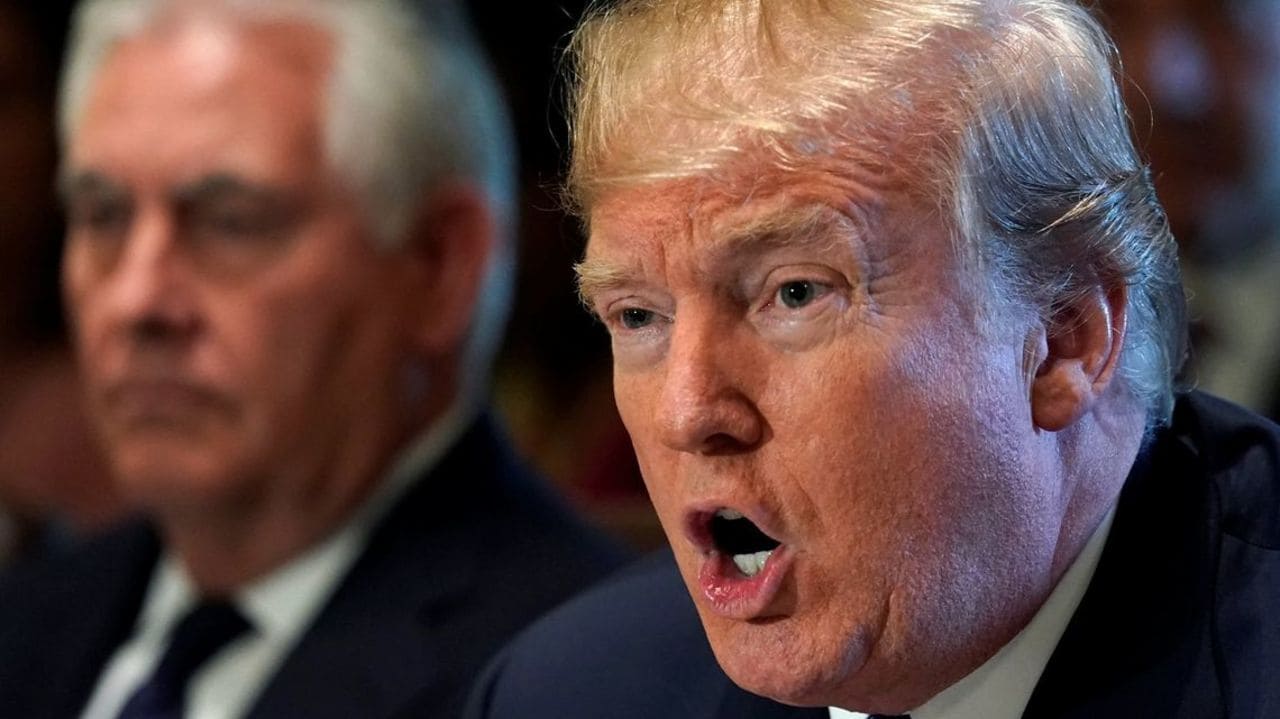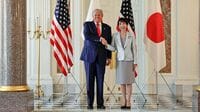
If everything goes according to plan, the visit of U.S. President Donald Trump to Japan next week should be a great success. The well-organized visit is scheduled down to every last minute and packed with events designed to showcase the remarkably close relationship between Trump and Japanese Prime Minister Shinzo Abe.
The visit will demonstrate a united front against North Korea – from the meeting with the families of abductees to a joint appearance before American and Japanese soldiers. Inconvenient subjects, like trade, will be shoved to the side.
Japanese officials strongly believe that Japan can not only count on tight coordination with the U.S. but Abe and his staff can also have a significant influence over Trump. The goal makes perfect sense from the standpoint of Japan’s national interest. Japanese, as policy makers in Tokyo like to point out, did not elect Mr. Trump. But they have no choice but to stay close to him.
Still, are Japanese officials, from Abe on down, engaging in some wishful thinking about Trump? It is, after all, not clear than anyone, even his children, can really claim to influence him. More seriously, Japanese policy makers, and Japanese people more broadly, may underestimate the unprecedented nature of the Trump administration.
It is not that Japan is isolated from the news coming out of Washington. But Japan is largely insulated from the political chaos that has swept through Europe and the U.S. in the last two years. From the Brexit vote to elections in Europe and the U.S., there has been an eruption of rightwing nationalism, a populist revolt against established leaders, parties and systems, undergirded by racism and anti-immigrant feelings, that reminds many of the growth of fascism in pre-war Europe.
Japan is not totally immune to some of these responses to globalization, not least in hostility to immigrants and nationalist feelings. But crucially there is no evidence of a populist revolt against the system itself in Japan. That makes it difficult for Japanese to understand the Trump phenomena and what might be coming.
Here are five things that Japanese may not fully understand:
1. The United States is now deeply divided
The division of the U.S. into two polarized political nations – a “red” America and a “blue” America – has now reached almost complete separation.
From the sources of information that each American reads and watches to where they live, Republicans and Democrats simply live in different worlds. From social media platforms like Facebook to everyday life, people in the two Americas often have very little contact with the other camp.
This division is evident in opinion polls which show massive majorities of Republicans – more than 8 in 10 – continue to approve of Trump’s performance even while most Americans, not only Democrats but also independents, disapprove of him.
The division is reflected – and formed to some extent – in the news media. The media in the Trump camp, led by Fox News but also including powerful online sources such as Steve Bannon’s Breitbart News, offer an almost completely distinct version of events than can be found in newspapers like the New York Times and Washington Post, or CNN and MSNBC cable news.
When the indictments of Trump campaign officials came out this week, for example, Fox News programs focused instead on allegations of corrupt ties of Hillary Clinton and the Democrats to Russia.
The United States has not seen such deep splits since the days of the Vietnam War. Indeed a poll published this week by the Washington Post found that seven in 10 Americans now believe the divisions are comparable to the Vietnam era. That poll, and others, finds a growing pessimism about the political system – from Congress and the media, to the presidency – as permanently dysfunctional.
2. Trump is unpopular and weak
While President Trump commands attention, from his twitter feeds to the constant drama coming out of the White House, he has become very quickly one of the most unpopular and weak Presidents in modern history.
The latest poll results from the Wall St Journal and NBC News found that his job approval rating now stands at 38 percent, itself a five point drop from the level measured in September. Some 58 percent of those polled, nearly two out of three, disapprove of the job that Donald Trump is doing as president.
That judgment extends to Trump’s handling of every issue and specific crises facing the country, with the one significant exception of the economy. Some 51 percent disapprove of his handling of North Korea, for example, and 53 percent of his role as Commander in chief. Even on the economy, only 42 support think he is doing a good job, slightly more than the 37 percent who disapprove.
When it comes to actual accomplishments, there are few to point to at this point, pending passage of tax cuts. “For a man in the White House whose party controls both Houses of Congress, Trump is remarkably weak,” says Brad Glosserman, an expert on U.S.-Japan relations, currently a visiting professor, Center for Rule Making Strategy at Tama University. “He is a disrupter in chief. He can tear things down, create chaos and shake up expectations, but he has proven singularly incapable of creating anything.”
In some ways, Glosserman adds, this has actually given Congress a great amount of power, relative to the President. “Trump wants wins – any win – and he will sign anything that Congress puts on his desk so he can claim victory. The substance is almost irrelevant as Trump doesn’t care about details and can’t be bothered to understand legislative complexities and nuances.”
3. Congress is not prepared to fulfill its constitutional role
In the American constitutional system, the Congress is supposed to act as a separate and equal branch of government, with the responsibility to restrain, if not overrule an incompetent or dangerous executive.
In the ultimate form, this can mean the impeachment of the President. But despite the unusual acts of public denunciation of the President by several Republican Senators – including the chairmen of the armed services and foreign affairs committees – there is little sign that Congress is prepared to act.
Rather than providing a check on Trump, the Republican leaders of Congress “are operating as members of a tribe, the Republican tribe, rather than as components of a branch, the checks-and-balances legislative branch,” James Fallows wrote this week in The Atlantic.
4. The Generals May not Save us
In the absence of Congressional leadership, many look to the U.S. military to keep Trump from running off the rails. Key positions in the Trump administration’s foreign and security policy are occupied by current or former senior military officers – most importantly, White House Chief of Staff retired four-star Marine general John Kelly, national security advisor active duty three-star Army General H.R. McMaster, and retired four-star Marine General James Mattis. Japanese officials, and many in Washington, are counting on these men to block any reckless military move, in North Korea or the Middle East.
Of this group, Mattis is the most trusted. He is considered, says Fallows, “civic-minded, broadly informed, historically aware. Among all Trump appointees, he has best maintained his pre-Trump reputation and dignity.”
But McMaster, who is considered a scholarly military leader, is increasingly seen as struggling to exert influence inside the White House. And Kelly lost significant regard as a check on Trump when he stepped forward to defend the President’s crass handling of the death of soldiers in west Africa.
For now, the generals are generally viewed as the “adults” who will keep an unpredictable Trump, in a burst of anger, from triggering a war. “In the long term,” Fallows warns, “their presence and importance is quite an unhealthy sign. This is not how ‘civilian control of the military’ has usually looked.”
5. The question of Trump’s mental state
The most troubling issue for some American policy analysts – and one which Japanese officials strictly avoid discussing for obvious reasons – is whether the President is emotionally and mentally stable. Psychiatrists have questioned whether he suffers from an extreme form of narcissistic disorder.
Others point to the President’s seeming difficulty in sustaining a focus on complex issues of policy, with suggestions that he suffers from a mental disability known commonly as Attention Deficit Disorder (ADD).
“In practice, or real life, as any professional will tell you, being ADD means not just having difficulty staying focused, but, ironically, being vulnerable to fixating on something and not being able to let go,” says Chris Nelson, editor of the influential Nelson Report newsletter on U.S. policy toward Asia.
“In an interview, it’s notable that Trump is not just constantly shifting the subject and offering incomplete thoughts and incomplete sentences, but often shows a consistent inability, even disinterest, in ‘staying on topic’. Trump is known to keep the TV cable news on all the time, even during an interview, and constantly interrupts to comment on what he’s just seen. “
Whether such diagnoses are accurate, says Nelson, professionals from the intelligence community and the White House staff reportedly are challenged to find a way to engage Trump’s attention in preparing briefing materials for the President.
As Trump heads off on a 12-day trip to Asia, the longest journey away from the White House to date, White House staff reportedly worry about his ability to stay on message. With the prospect of a Watergate-scale scandal that can potentially drive him from office, that will be even more difficult.



